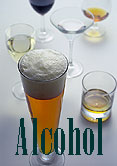- Could Your Grocery Store Meat Be Causing Recurring UTIs?
- Are You Making This Expensive Thermostat Error This Winter?
- Recognizing the Signs of Hypothyroidism
- 10 Strategies to Overcome Insomnia
- Could Artificial Sweeteners Be Aging the Brain Faster?
- Techniques for Soothing Your Nervous System
- Does the Water in Your House Smell Funny? Here’s Why
- Can a Daily Dose of Apple Cider Vinegar Actually Aid Weight Loss?
- 6 Health Beverages That Can Actually Spike Your Blood Sugar
- Treatment Options for Social Anxiety Disorder
Alcohol Taxes May Give Boost to Public Health, Economy


Some may believe that raising taxes on alcohol products will cost jobs in the service sector, but a new study suggests that’s made up for by job creation elsewhere.
The findings were to be reported Tuesday at the annual meeting of the American Public Health Association in New Orleans.
“Money not spent on alcohol, coupled with the newly raised tax revenues, will be spent on other goods and services which will create jobs in non-alcohol sectors, offsetting any losses experienced in alcohol sectors,” study author Frank Chaloupka, professor of economics at the University of Illinois at Chicago, said in an association news release.
According to Chaloupka’s team, excessive drinking causes about 88,000 deaths a year in the United States and cost the nation $223.5 billion in 2006, or $1.90 per drink. In contrast, total federal and state taxes on alcohol in 2006 totaled only about 12 cents per drink.
Heavy drinkers pay more alcohol taxes — for example, 82 percent of the total in Louisiana, 80 percent in Texas and 77 percent in California — than light drinkers. Chaloupka reasoned that any increase in alcohol taxes might help reduce heavy drinkers’ alcohol consumption.
And while critics of higher alcohol taxes say such a move would cause job losses, the new study suggests that the opposite is true.
“This new research suggests this argument is not only false, but that alcohol taxes can actually lead to more jobs,” Chaloupka said.
For example, according to the study, an additional tax of five cents a drink would create about 21,500 jobs in California if the tax revenue was put in the government’s general fund, and a 25-cent-per-drink tax increase would lead to 95,000 more jobs.
The same alcohol tax increases would create about 7,800 and 35,000 jobs, respectively, in Texas and 850 and 3,800 jobs, respectively, in Louisiana.
“Alcohol tax increases are an evidence-based approach to improving health, and importantly, yield a small net increase in jobs,” study author David Jernigan, director, Center on Alcohol Marketing and Youth, Johns Hopkins Bloomberg School of Public Health, said in the news release.
Experts note that studies presented at medical meetings are typically considered preliminary until published in a peer-reviewed journal.
More information
The U.S. National Institute on Alcohol Abuse and Alcoholism has more about alcohol and your health.
Source: HealthDay
Copyright © 2026 HealthDay. All rights reserved.










